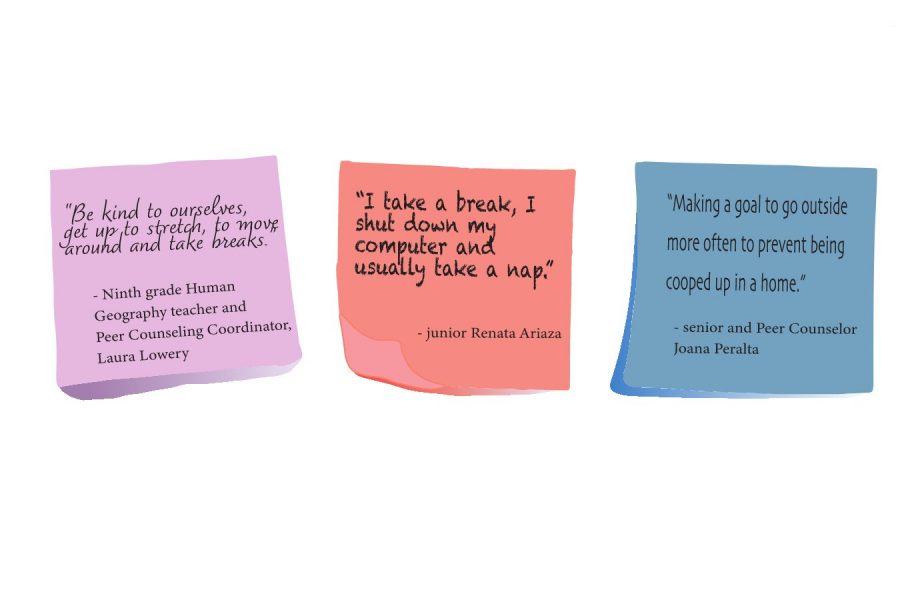As students enter their ninth month in quarantine, many are struggling with mental health problems. Programs at Bonita Vista High such as Wellness Wednesday and Peer Counseling serve to help student mental health.
“I’m not doing okay right now”
Nine months of quarantine takes a toll on students' mental health
Bonita Vista High (BVH) officially closed its doors on March 13 due to the COVID-19 pandemic. On Aug. 3, BVH started the 2020-2021 school year for the first time through distance learning. During the past nine months in quarantine, remote learning has posed as a struggle for students causing them to experience worsening mental health.
For junior Renata Ariaza, she has to balance her home life and school work along with the isolation of not seeing her friends at school. She believes the combination of these factors have affected her mental health negatively.
“It’s been very hard trying to do distance learning. And it’s even worse when your parents [say], ‘you have the whole entire day here; you should be finishing all your work today.’ You [say], ‘Whoa, I have just spent so much time [on] the computer,’” Ariaza said.
Ninth grade Human Geography teacher and Peer Counseling Coordinator Laura Lowery expresses that in addition to the difficulty of managing homework, some students are experiencing the stress of home life. According to BVH Psychologist Martha Ingham, these factors have made the nine months in quarantine difficult for a lot of students.
“Through our meetings, the majority of students have found distance learning to be stressful,” Ingham said. “Some have lost motivation to attend or complete assignments. Many have parents working outside the home as essential workers. These students are finding it very challenging to stay self-disciplined by attending online classes and completing assignments.”
According to Phelps, many BVH staff are working hard to make sure students know they are not alone. Teachers and administrators have been working to implement procedures and programs in the classroom such as Wellness Wednesdays.
“At the start of the 2020-2021 school year, our district indicated that there was a need for us to find ways to support our students’ emotional well-being as well as their academic learning,” International Baccalaureate (IB) Coordinator Jared Phelps said.
For the past nine weeks, Phelps has hosted Wellness Wednesday sessions from 8:30 to 9 a.m., but for the rest of the semester, he hopes to instead do them from 5 to 5:30 p.m. in order to fit students’ schedules.
“In March [2020], I attended an IB Leadership training that focused on wellness and social or emotional learning. I resolved to put a small program together at [BVH] to support our IB students who are just as stressed as any other group of students on campus, if not more,” Phelps said.
Lowery is also helping students through her administration of the Grief and Loss support group hosted through the Peer Counseling program this year after it had been inactive for five years.
“With COVID-19, [there are] all of these tragic losses, the loss of normalcy [and] our social lives, and what we thought the high school experience would be. Whether or not students realize it, I think we are all grieving some very significant losses, even if it’s not the death of a loved one,” Lowery said.
Programs like Peer Counseling help students who feel isolated to seek help or ask for advice. Support groups vary from topics including Grief and Loss, Sexual Identity, Girls to Women, Boys to Men, Positive Thinking and Academic Stressing and Anxiety. These group sessions are led by at least one teacher facilitator and assisted by several Peer Counselors.
“It’s easy to ignore everything; it’s easy to shut yourself out from the world. It’s so easy to just ignore the computer and not [be] involved in the work and easily miss assignments that are due,” Peer Counselor, facilitator of the Academic Stressing and Anxiety support group and senior Joana Peralta said. “We Peer Counselors are here as a resource for [BVH students] to speak to and rely on.”
Students like Ariaza feel that reaching out to teachers to discuss their struggles is helpful, even if it’s through the means of Google Forms. For Lowery, this provides a new perspective and helps them re-adjust to the students’ situation.
“For the Google Forums [used for student wellbeing], I don’t know how honest [teachers] want us to be, but I’m pretty honest. I’m like, ‘yeah, I’m not doing okay right now—just letting you know.’ So I feel like it’s a way to let the teacher know,” Ariaza said.
Although programs such as Peer Counseling are put in place to help students, they don’t come without difficulties, especially when reaching out to students according to Lowery.
“It’s hard because the situations that [some] students might want to talk about in a support group are problems they’re having at home, so talking openly and honestly can be a challenge.” Lowery said. “We’re trying to make sure that if the student doesn’t have a private room, they’re wearing headphones [during support groups].”
As many students continue to deal with mental health issues during remote learning, Phelps believes it is okay for students to admit that they are struggling because it will ultimately help them grow and overcome their difficulties.
“It’s been a big struggle for a lot of students, and I’m really glad that many of them feel comfortable reaching out and admitting they’re having trouble. Admitting our challenges can be hard and it’s an important step toward getting support, growing and ultimately conquering our challenges,” Phelps said.
